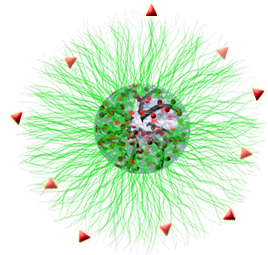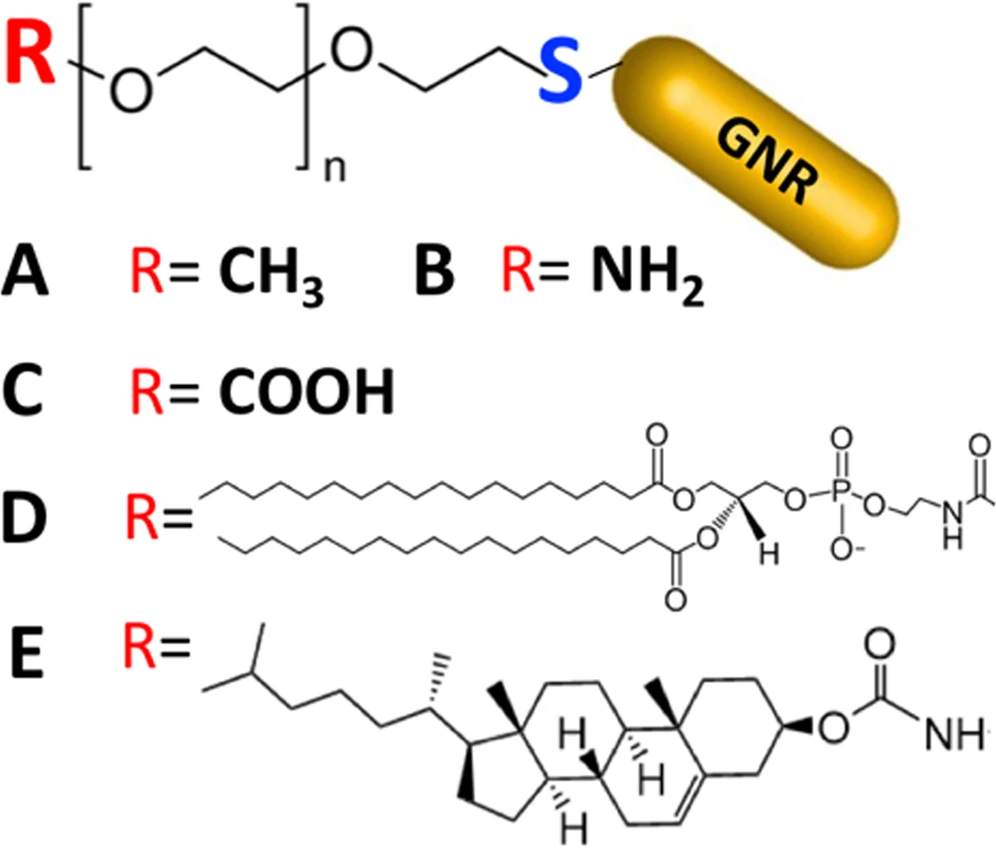About NSP
Nanosoft Polymers (NSP) specializes in bridging the gap betwe en polymer and drug delivery by supplying ready-to-use functionalized polymer & copolymers for use in therapeutics, devices and diagnostics.
en polymer and drug delivery by supplying ready-to-use functionalized polymer & copolymers for use in therapeutics, devices and diagnostics.
 NSP manufactures and sells a unique collection of functional polymers, copolymers, and polymer conjugates. NSP's polymer catalog includes functional PLGA-PEG, PLA-PEG, PCL-PEG, lipid-PEGs, poly(L-lysine)-PEG, poly(L-glutamic acid)-PEG and pegylation reagents that can be used in your research involving drug/gene delivery, encapsulation, cell adhesion and surface modification.
NSP manufactures and sells a unique collection of functional polymers, copolymers, and polymer conjugates. NSP's polymer catalog includes functional PLGA-PEG, PLA-PEG, PCL-PEG, lipid-PEGs, poly(L-lysine)-PEG, poly(L-glutamic acid)-PEG and pegylation reagents that can be used in your research involving drug/gene delivery, encapsulation, cell adhesion and surface modification.
NSP also specializes in polymer synthesis and functionalization, nanoparticle fabrication, surface modification, and custom synthesis of reactive oligomers and polymers with a broad range of molecular weights.
Our Mission
We are dedicated to building a long-term, trusting relationship with our customers by offering quality functional polymers and copolymers backed up with exceptional customer service and technical support.
![]() High quality We guarantee the superior quality of our products by providing real analytical data with excellent lot-by-lot reproducibility.
High quality We guarantee the superior quality of our products by providing real analytical data with excellent lot-by-lot reproducibility.
![]() Quick delivery We keep catalog items in stock. Overnight delivery is possible in US. Delivery is quick to other worldwide locations, too.
Quick delivery We keep catalog items in stock. Overnight delivery is possible in US. Delivery is quick to other worldwide locations, too.
![]() Simple payment We accept NET 30 days payments, Credit cards, checks, and wire transfers.
Simple payment We accept NET 30 days payments, Credit cards, checks, and wire transfers.
![]() Great pricing We provide excellent pricing for our products. Check out our catalog now and compare the prices with our competitors.
Great pricing We provide excellent pricing for our products. Check out our catalog now and compare the prices with our competitors.
![]() Professional support We provide the highest level of technical support to our customers.
Professional support We provide the highest level of technical support to our customers.
![]() Fast turnaround Our experienced team work together to make sure quick turnaround for your orders.
Fast turnaround Our experienced team work together to make sure quick turnaround for your orders.
New products
![]() Nanosoft Polymers offers polysarcosine , which is an endogenous and has previously shown potent stealth properties.
Nanosoft Polymers offers polysarcosine , which is an endogenous and has previously shown potent stealth properties.
![]()
Nanosoft Polymers offers PEG-poly(α-benzyl carboxylate-ε-caprolactone), which has functional side groups on the polyester block for micelle core modification!
![]() Nanosoft Polymers offers multi-arm PLGAs for drug delivery and biomedical research!
Nanosoft Polymers offers multi-arm PLGAs for drug delivery and biomedical research!
![]() Nanosoft Polymers offers Functional linear polyamino acids for drug delivery and surface modification!
Nanosoft Polymers offers Functional linear polyamino acids for drug delivery and surface modification!
![]() Nanosoft Polymers offers functionalized PEI-PEGs for in vitro and in vivo gene delivery!
Nanosoft Polymers offers functionalized PEI-PEGs for in vitro and in vivo gene delivery!
![]() Nanosoft Polymers offers Functional linear polyamino acids for drug delivery and surface modification!
Nanosoft Polymers offers Functional linear polyamino acids for drug delivery and surface modification!
![]()
Nanosoft Polymers offers Folate-PEG-PLA/PLGAfor targeted nanoparticles!
![]() Nanosoft Polymers offers Folate-PEG-PLA/PLGAfor targeted nanoparticles!
Nanosoft Polymers offers Folate-PEG-PLA/PLGAfor targeted nanoparticles!
![]()
Nanosoft Polymers offers DSPE-PEG-DBCO for copper-free click chemistry!
![]()
Nanosoft Polymers offers DSPE-PEG-Azide for bioconjugation by "click chemistry"!
![]() Nanosoft Polymers offers PLGA-PEG-Maleimide, and PLGA-PEG-Amine for gene/drug delivery!
Nanosoft Polymers offers PLGA-PEG-Maleimide, and PLGA-PEG-Amine for gene/drug delivery!
![]() Nanosoft Polymers offers Azide-PEG-PLL and Azide-PEG-pAsp for gene/drug delivery!
Nanosoft Polymers offers Azide-PEG-PLL and Azide-PEG-pAsp for gene/drug delivery!
![]() Nanosoft Polymers offers custom synthesis for your special demand. Please contact us!
Nanosoft Polymers offers custom synthesis for your special demand. Please contact us!
NSP Products In Literature
NSP’s Lipid were used to develop Endotoxin-adsorbing macrophage-mimetic hybrid liposome for sepsis treatment
 Sepsis is a life-threatening condition resulting from bacterial or fungal infections. Common treatments for sepsis, such as antibiotic therapy, are far from satisfactory. Because endotoxin (LPS) is a major pathogenic factor in sepsis caused by gram-negative bacterial infections, neutralization of LPS is a promising therapeutic target. To effectively eliminate LPS, in a recent study published in Chemical Engineering Journal, a macrophage-mimetic hybrid liposome (M-Lipo) was developed by fusing a macrophage membrane (M-membrane) with artificial lipids (Nanosoft Polymers). The M-membrane could provide an intrinsic binding site for LPS. The artificial PEGylated lipid could stabilize the natural membrane and prolong the circulation of M-Lipo in the bloodstream. These two membranes could complement one another and extend their biofunction as they were integrated. The results showed that M-Lipo had surface proteins similar to those of macrophages and could substantially adsorb LPS. With the help of the PEGylated lipids (Nanosoft Polymers), M-Lipo presented much better stability than the bare M-membrane vesicle. In addition, the pharmacokinetic results revealed that M-Lipo clearly had longer retention (∼16%) in blood (at 12 h) than the natural M-membrane (∼3.3%). By combining these properties, the hybrid M-Lipo not only reduced the toxicity of LPS in vitro but also protected the mouse against endotoxic shock in vivo. In conclusion, the hybrid liposome M-Lipo has the advantages of both natural membranes and artificial materials, eventually leading to the successful treatment of sepsis. Chemical Engineering Journal (31), 15-25, 2019.
Sepsis is a life-threatening condition resulting from bacterial or fungal infections. Common treatments for sepsis, such as antibiotic therapy, are far from satisfactory. Because endotoxin (LPS) is a major pathogenic factor in sepsis caused by gram-negative bacterial infections, neutralization of LPS is a promising therapeutic target. To effectively eliminate LPS, in a recent study published in Chemical Engineering Journal, a macrophage-mimetic hybrid liposome (M-Lipo) was developed by fusing a macrophage membrane (M-membrane) with artificial lipids (Nanosoft Polymers). The M-membrane could provide an intrinsic binding site for LPS. The artificial PEGylated lipid could stabilize the natural membrane and prolong the circulation of M-Lipo in the bloodstream. These two membranes could complement one another and extend their biofunction as they were integrated. The results showed that M-Lipo had surface proteins similar to those of macrophages and could substantially adsorb LPS. With the help of the PEGylated lipids (Nanosoft Polymers), M-Lipo presented much better stability than the bare M-membrane vesicle. In addition, the pharmacokinetic results revealed that M-Lipo clearly had longer retention (∼16%) in blood (at 12 h) than the natural M-membrane (∼3.3%). By combining these properties, the hybrid M-Lipo not only reduced the toxicity of LPS in vitro but also protected the mouse against endotoxic shock in vivo. In conclusion, the hybrid liposome M-Lipo has the advantages of both natural membranes and artificial materials, eventually leading to the successful treatment of sepsis. Chemical Engineering Journal (31), 15-25, 2019.
NSP’s functional lipid-PEG were contributed to gold nanorods for photothermal-based antibacterial activity

Skin is considered as the ideal site for non-invasive skin therapeutic platforms. In a recent study published in Scientific Reports, a library of gold nanorods (GNR) decorated with polyethylene glycol-thiol (PEG-SH) containing different functionalities were synthesized and characterized. The results demonstrated that cholesterol-PEG coated GNR were preferentially loaded up in the upper layers of skin (stratum corneum), while phospholipid-PEG coated counterparts were drastically deposited in skin dermis. Neutral methoxy-PEG-coated GNR were distributed in both SC and dermis skin layers, while charged GNR (anionic-carboxylic acid-PEG-GNR and cationic-amine-PEG-GNR) revealed a minimal accumulation into skin. DSPE-PEG-GNR and Chol-PEG-GNR demonstrated antibacterial activities against Staphylococcus aureus (S aureus) at MIC values of 0.011 nM and 0.75 nM, respectively. Photothermal treatment for S. aureus at sub-MIC concentrations resulted in a significant bactericidal effect when using Chol-PEG-GNR but not DSPE-PEG-GNR. Gold-based nanoscale systems have great value as a promising platform for skin diseases therapy. Scientific Reportsvolume 9, Article number: 5796 (2019).




